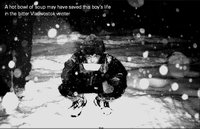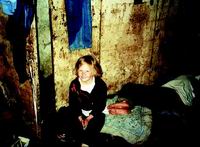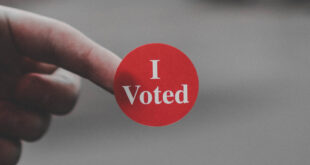Story by Reuben Bonner, Photographs supplied by Rachael Hughes
Not many people would make sandwiches for someone who is trying to pickpocket them, but on Christmas Eve 1997, in the middle of a Russian winter, 27-year-old New Zealander Rachael Hughes found a small hand on her wallet as she tried to put it in her back pocket. She turned to see an eight-year-old boy cold, hungry and homeless. She bought him something to eat, and as he wolfed it down, she knew she had to try and help. Not just him, but as many of the forgotten children of Vladivostok’s streets as she could.
The following day — Christmas day — Rachael made sandwiches and walked through the city handing out the food to children. Within a month she was feeding thirty children aged between 8 and 15 on a daily basis. She didn’t ask for this job, but she’s kept it.
Rachael realised she couldn’t start something she wasn’t going to continue. As she chewed through her own income to feed the kids, and got down to the last of her money, she met a Russian sailor. He had found out what she was doing and tracked her down. He told her to wait for him on the street although it was cold and she didn’t want to. But he convinced her. She waited and he returned and handed her 500 US dollars. Three years previously God had told him to start saving money because he would need to give it to a woman feeding children on the streets. She realised she was doing what she should be doing.
 Fast-forward almost ten years and I am helping Rachael Hughes cart garden pots up to her Onehunga apartment. Seeing she has helped hundreds of street kids from the eastern seaboard of Russia find food, solace and a friendly face, the least I can do is lug some gardening gear, and tell as much of her story as possible. Her Auckland home/office is one of her two bases and a far cry from the other life she lives. Her second office is amongst the mean streets of Vladivostok, 9900km away, where temperatures sink to around -20 in winter and where kids as young as five are living on the streets, in the sewers, and with nowhere else to go.
Fast-forward almost ten years and I am helping Rachael Hughes cart garden pots up to her Onehunga apartment. Seeing she has helped hundreds of street kids from the eastern seaboard of Russia find food, solace and a friendly face, the least I can do is lug some gardening gear, and tell as much of her story as possible. Her Auckland home/office is one of her two bases and a far cry from the other life she lives. Her second office is amongst the mean streets of Vladivostok, 9900km away, where temperatures sink to around -20 in winter and where kids as young as five are living on the streets, in the sewers, and with nowhere else to go.
Since making sandwiches in 1997, Rachael has busied herself with the founding and running of Living Hope. It’s a non-profit organisation which provides assistance to hundreds of the street kids in Vladivostok. They’ve come a long way. It now has full-time staff manning a drop-in day centre, cafeteria, and a mobile soup kitchen. There is an annual camp trip where the kids are taken away for a break from the harshness of their reality.
They get to be kids again with organised games and activities, and they’re provided with medical checkups and treatment. Nine out of ten girls who they see have some kind of STD. It isn’t really a surprise seeing prostitution is so common it is almost accepted in Vladivostok. Sexual morality is different there; Rachael was blown away by it.
“In general, I think because Russians live in such small apartments, the kids don’t grow up naive. They’re already aware of procreation, and the world around them, because it’s happening in the same room as they’re living in. For a twelve year old to be sleeping around, or working as a prostitute, it isn’t shocking, it’s just a part of life.”
Rachael and her team are still working hard on acquiring a full-time shelter where the kids can have a roof over their head 24/7.
In 1997 when Rachael was being pick-pocketed, things were different in Vladivostok. It was backward. There were no ATM’s and you couldn’t use a credit card. Some attitudes towards the street kids were of disdain, and the awareness of their plight was minimal. Living Hope has helped make a lot of changes.
“The biggest difference between Kiwi street kids and Russian street kids is that Kiwi street kids have a choice. They may have run away from a foster home or an orphanage, but there’s always someone to help, if they want it. In Vladivostok these kids don’t have a choice. They’re five years old or eight years old and they have nowhere to turn except the streets.”
 Rachael Hughes grew up in Maraitai, Auckland. She went to Howick College and left to study fashion design. She had her own business making wedding dresses but decided it was time for a change. That change was to go and volunteer for the Israeli army. After that Rachael first went to Russia in 1997 as a volunteer for the Russian Jews, helping them repatriate to Israel. Then she went to Vladivostok to teach English and children bible studies for a year at the local church. “I essentially went back as a missionary for the church, but it’s easier to say teaching English because sometimes when people hear the word religious they think you’re a fanatic,” she laughs.
Rachael Hughes grew up in Maraitai, Auckland. She went to Howick College and left to study fashion design. She had her own business making wedding dresses but decided it was time for a change. That change was to go and volunteer for the Israeli army. After that Rachael first went to Russia in 1997 as a volunteer for the Russian Jews, helping them repatriate to Israel. Then she went to Vladivostok to teach English and children bible studies for a year at the local church. “I essentially went back as a missionary for the church, but it’s easier to say teaching English because sometimes when people hear the word religious they think you’re a fanatic,” she laughs.
She hated Russia at first. The cold was like nothing she had ever experienced and it was a different life all together. Being part Jewish, Rachael came across a lot of anti-Semitic feeling, which is still prevalent in parts of Russia. As soon as people found she was part Jewish, anti-Semitic signs would appear on the door of the places she lived and animosity from some of the locals wasn’t exactly subtle. Further to that, suspicions were raised about her intentions in helping the children.
“People are afraid of what they don’t know. Philanthropy, charity and humanitarian aid is not part of the communist Russian culture because everybody had to look after themselves and guard their own back. There’d be no trust. And if people don’t really know what you’re doing, they’re skeptical. I’ve been accused of so many things — people thought if I was feeding kids, there had to be a reason.”
She was followed by the KGB and her phones were tapped. Some referred to her as the Mafia Momma and offered theories that she was using the kids she was helping to beg on the streets to get money for her. Some thought she was fattening up the children so she could sell them on the black market for body parts.
“For some reason, from the very first point that I realised I was being followed I found it really funny. Especially when they were trying to intimidate me. I would be more and more amused.
“One day, as soon as I left my apartment somebody started following me, and I got on the bus, (and buses are really crowded), and he elbowed his way to stand right next me. Then I headed into a department store to look at a pillow and he was right there looking at pillows. It just amused me.”
But she doesn’t want to bag the Russian authorities. The government endorses what she does, they help and she couldn’t do it without their support.
“In the nine years I’ve been there I’ve seen the change. We’ve had a lot of people step up and help us. Volunteer their time and their work, and now we are starting to see Russian businesses starting to give. They don’t give money but they give food and clothing and more and more people are understanding philanthropy and getting involved in it.”
Rachael’s walked a hard, lonely road. She hasn’t had a lot of time for a personal life or a partner, but is a firm believer in ‘what doesn’t kill you makes you stronger’. She’s changed a lot since adopting Russia as her other home, her eyes are more open to the world and she lives life.
“There’s been so many times I’ve been ready to give up because it’s been so hard. And I’ve been through so many hard, hard times and thought that I’d never get out of it, but it’s made me a person who enjoys life now and wants to get the best out of every minute, and enjoying people.
“I think it’s affected my personality to such an extent that I’ll never be the same as what I was when I left and I’m really glad that I’ve had to go through all that crap because I’m a much more content person than I was.”
Article courtesy of NZ Today.









anon3216 - 16 years ago
What a fantastic story of someone so young.